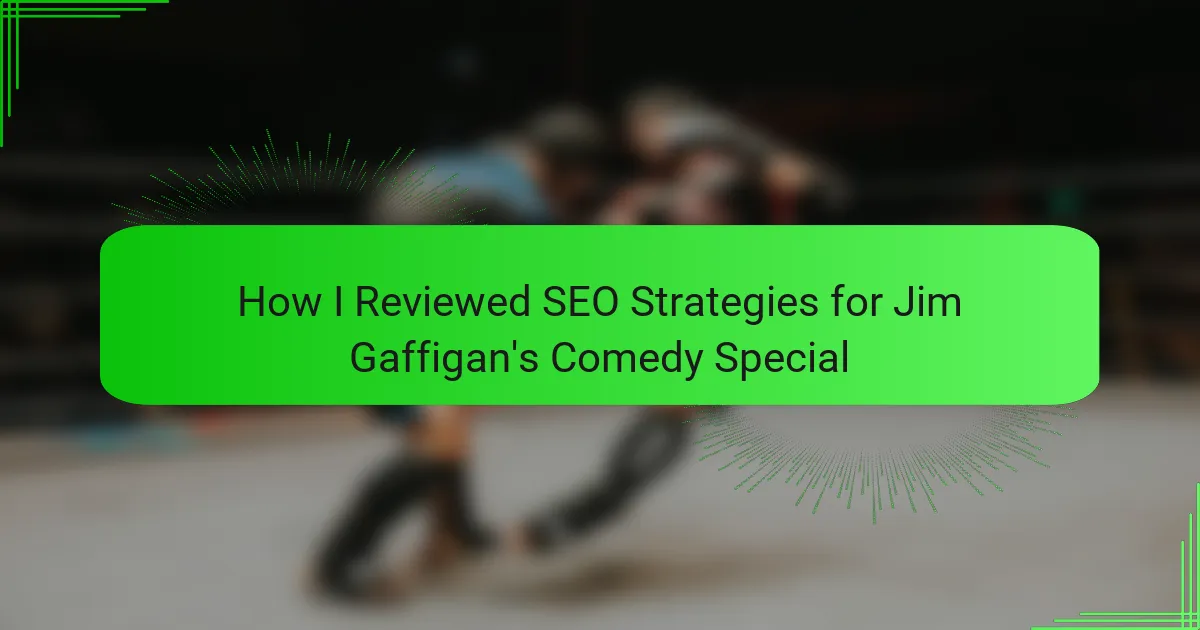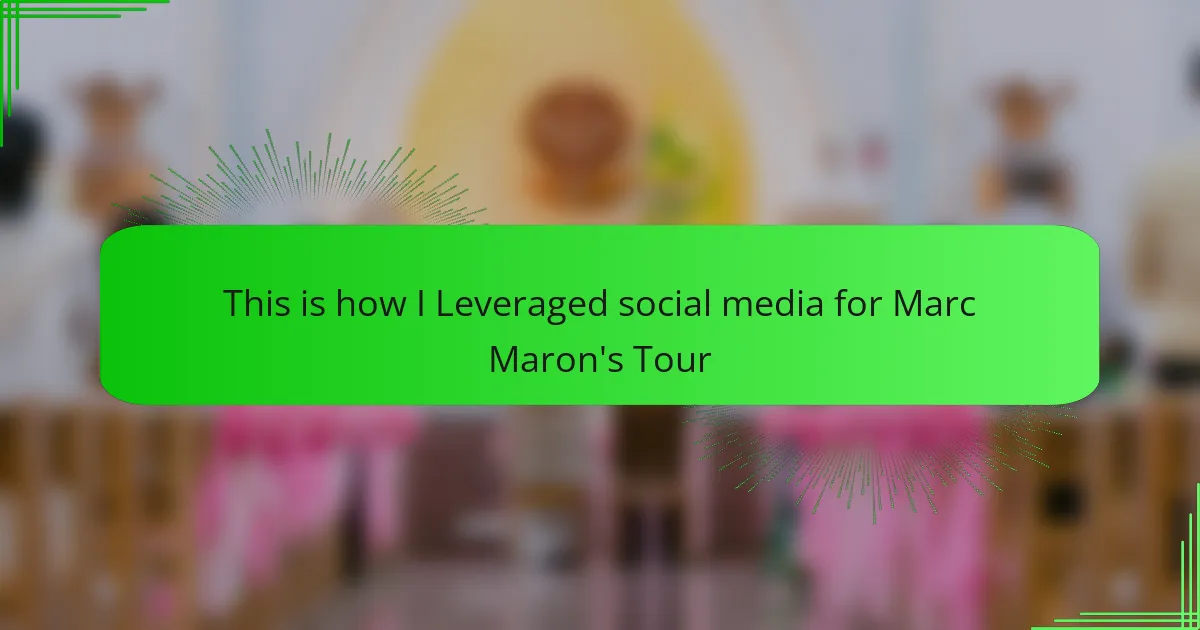Key takeaways
- Effective comedian tour promotions require a deep understanding of the target audience and a mix of creativity and strategic planning.
- Utilizing social media and local engagement can significantly boost audience excitement and ticket sales.
- Scheduling promotional activities around local events enhances visibility and creates natural synergy for engagement.
- Personal connections, such as spontaneous Q&A sessions, can strengthen ties between comedians and their fans, leading to increased loyalty and sales.
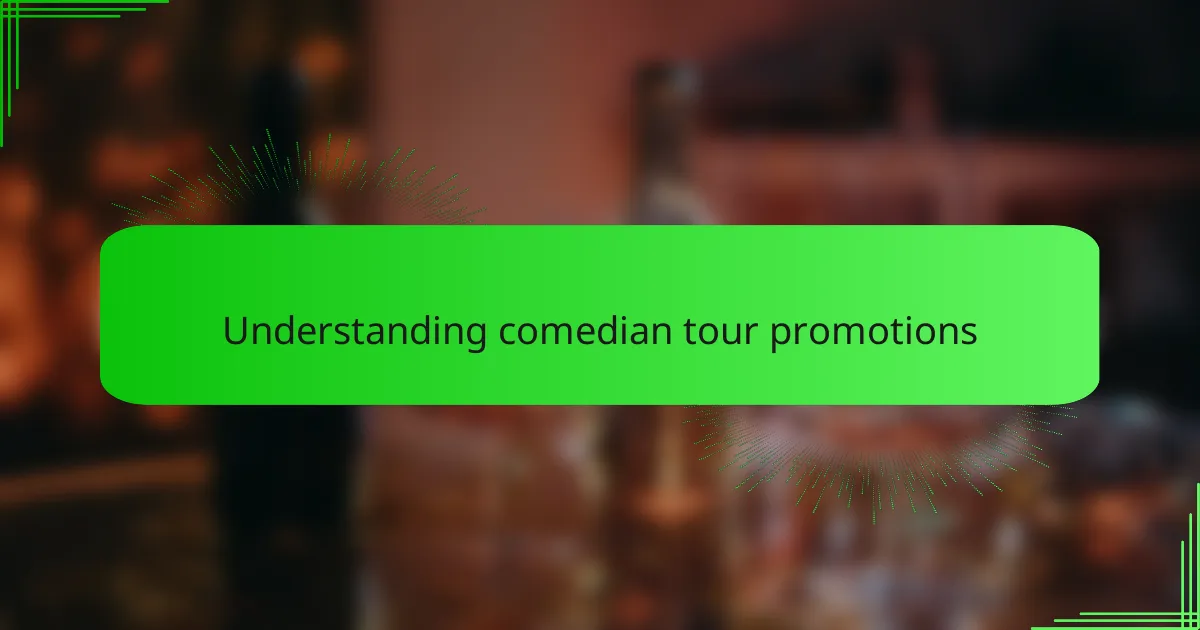
Understanding comedian tour promotions
Comedian tour promotions are an essential part of building an audience and ensuring a successful show. From my experience, promoting a comedian’s tour involves a combination of strategic planning, creativity, and understanding your target demographic. It’s more than just advertising; it’s about creating an engaging narrative that resonates with fans.
One of the most impactful aspects of promotions I’ve observed is the use of social media. Comedians like Whitney Cummings leverage platforms like Instagram and Twitter to connect directly with their audience. This personal touch fosters a sense of community and excitement. Here are some key elements to consider when planning a promotional campaign:
- Know Your Audience: Understand who your fans are and what type of content they engage with.
- Leverage Social Media: Use platforms for announcements, sneak peeks, and behind-the-scenes content to build anticipation.
- Local Engagement: Tailor promotions to local markets, collaborating with local influencers or comedians to reach wider audiences.
- Engagement Campaigns: Create contests or interactive posts that encourage fans to participate, making them feel involved in the tour.
- Consistent Branding: Maintain a consistent look and tone across all promotional materials to establish a recognizable identity.
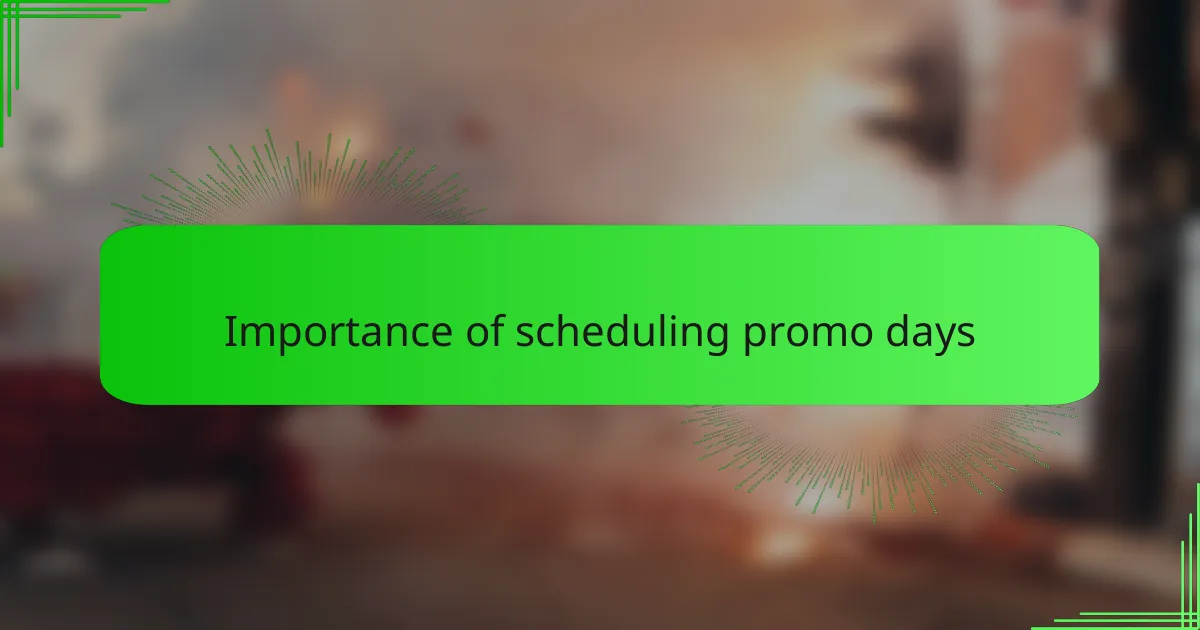
Importance of scheduling promo days
Scheduling promo days is crucial for maximizing visibility and generating buzz around a comedian’s tour. I’ve found that clear scheduling helps not only to align the promotional efforts with the tour dates but also to create anticipation among fans. When I coordinated promo days for Whitney Cummings, I noticed firsthand how strategically placed events could significantly boost ticket sales and audience engagement.
Establishing a structured timeline ensures that all promotional activities are executed efficiently. For instance, I always emphasize the importance of leveraging social media platforms and local press leading up to the shows. In my experience, these efforts can turn casual fans into loyal attendees, especially when they feel connected to the artist’s journey.
| Aspect | Impact |
|---|---|
| Clear Timeline | Ensures all promotional activities align with tour dates |
| Fan Engagement | Creates excitement and anticipation leading to increased ticket sales |
| Strategic Planning | Allows for efficient use of media platforms and local press |
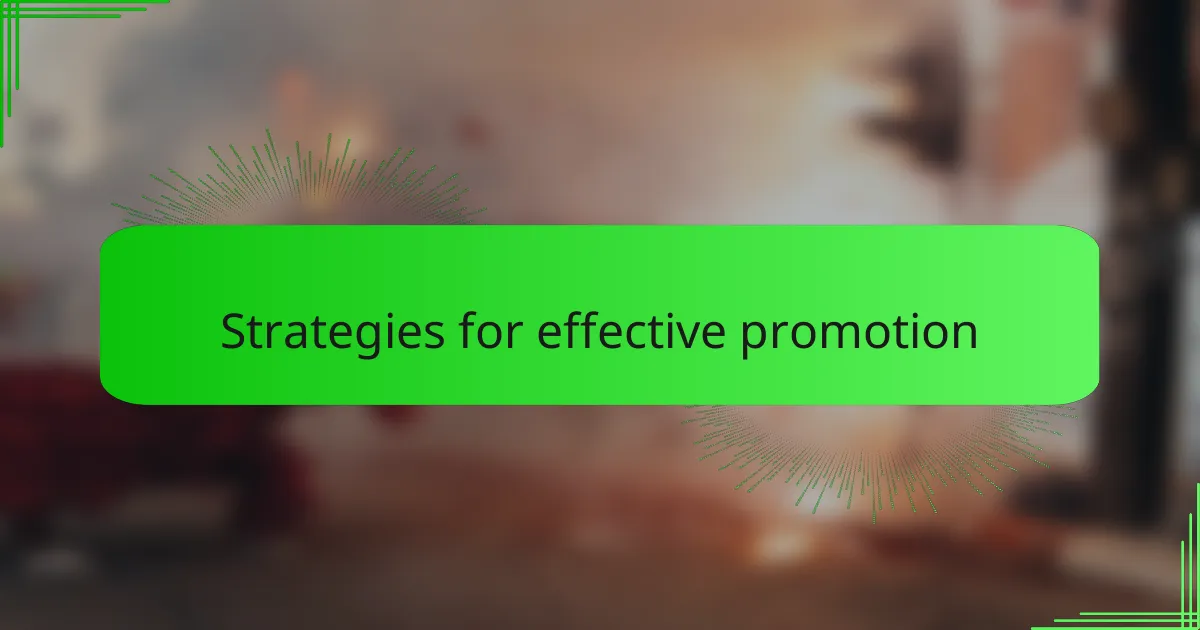
Strategies for effective promotion
When it comes to promoting Whitney Cummings’ tour, I’ve found that a mix of digital and personal outreach strategies works wonders. Utilizing social media platforms allows for an immediate connection with fans, while personal engagement through local media can resonate more deeply and drive ticket sales. I remember when we secured a spot on a popular morning show; the buzz generated from that appearance was electric and had a noticeable impact on ticket sales.
In my experience, timing is crucial. Scheduling promo days around local events or holidays can capture a larger audience’s attention. For instance, aligning our promotions with comedy festivals or community gatherings provides a natural synergy that amplifies our message. I’ve always felt that it’s not just about getting the word out, but about creating a buzz that gets people excited to see Whitney live.
Here’s a quick comparison of promotional strategies based on effectiveness:
| Strategy | Effectiveness |
|---|---|
| Social Media Campaigns | High |
| Local Media Engagement | Medium |
| Event Tie-Ins | Very High |
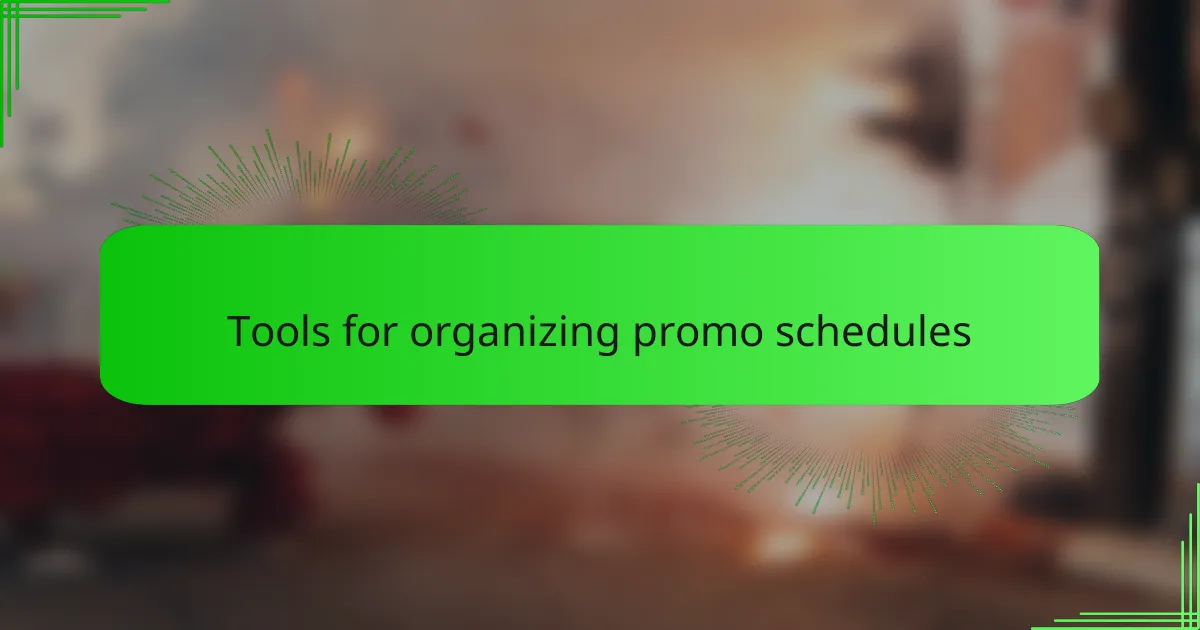
Tools for organizing promo schedules
When it comes to organizing promo schedules, I’ve found that leveraging the right tools makes all the difference. In my experience, various digital platforms can help streamline the complex process of scheduling. For instance, during Whitney Cummings’ tour promotions, I relied heavily on project management software that allowed the whole team to stay on the same page. It eased the stress that typically accompanies such tight timelines.
I’ve also discovered how essential communication tools are in this realm. Regular check-ins help ensure that everyone is aligned and that no promotional opportunity slips through the cracks. From my own experience, I remember missing a crucial interview slot simply due to a scheduling miscommunication, and that taught me the value of clarity and organization.
- Google Calendar for real-time updates and sharing across teams
- Trello or Asana for task management and tracking progress
- Slack for team communication and quick updates
- Airtable for maintaining a comprehensive database of promotional contacts
- Hootsuite for scheduling social media posts across platforms
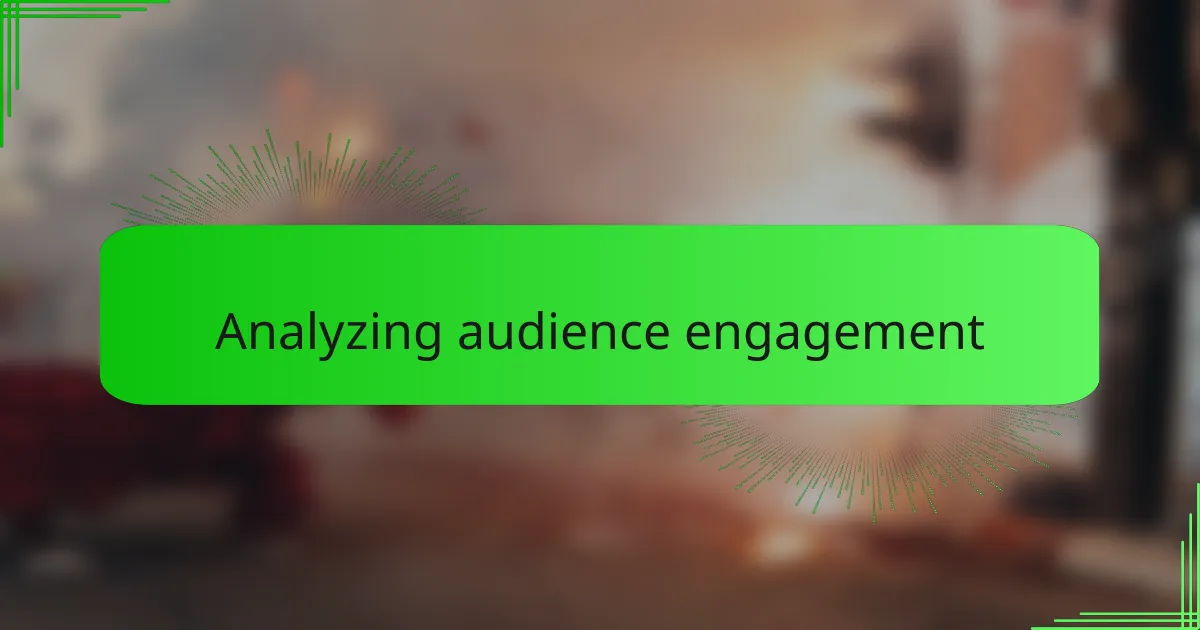
Analyzing audience engagement
Understanding audience engagement is key when scheduling promo days. During my work with Whitney Cummings, I found that gauging audience reactions on social media platforms played a significant role in deciding when and where to promote. One particular instance was a Twitter poll where fans voiced their preferred times for Q&A sessions; it turned out to be a game-changer for engagement.
From that experience, I learned that audience engagement isn’t just about timing; it’s about connection. By analyzing patterns in likes, shares, and comments, we tailored our promotional content to resonate more deeply with her fan base. Here’s what I focused on to enhance engagement during promotional days:
- Track social media metrics before and after promotional posts.
- Pay attention to audience feedback through comments and messages.
- Use polls and questions to directly involve the audience in decision-making.
- Monitor trends in engagement to adjust future scheduling.
- Ensure content is shareable to amplify reach and interaction.
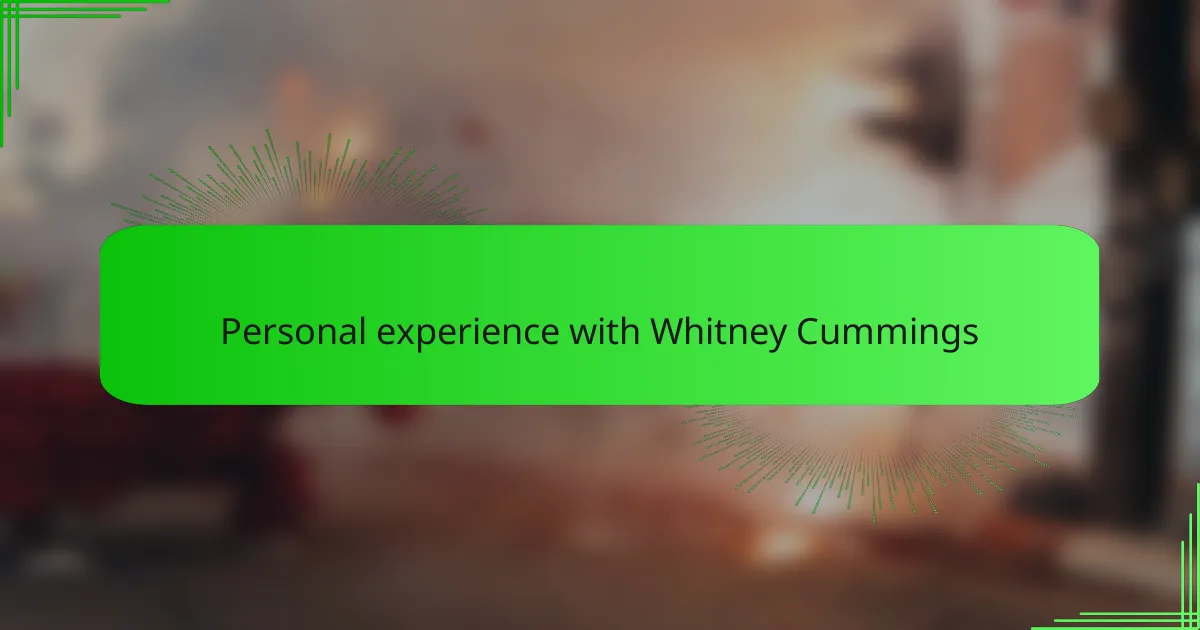
Personal experience with Whitney Cummings
During my time working with Whitney Cummings, I was consistently impressed by her genuine connection with fans. I remember being in the audience during one of her live shows, seeing the excitement on people’s faces as she walked on stage. It struck me how these encounters are not just performances; they feel like personal conversations. This experience deeply influenced my approach to scheduling promo days, emphasizing the importance of creating authentic moments that resonate with the audience.
One instance that stands out was when we decided to host an impromptu Q&A session on social media shortly before a show. I could feel the anticipation building as we announced it. The flood of questions and comments was overwhelming, but it showed me the power of engagement. People were eager to connect directly with Whitney, and that energy translated into higher ticket sales for the upcoming shows. It’s fascinating how such spontaneous interactions can forge stronger ties between a comedian and their audience.
Reflecting on these experiences, I realized that effective promotion goes beyond just logistics. It’s about tapping into emotions, understanding what makes fans excited, and weaving those sentiments into our scheduling strategy. Every promotional decision should aim to create that same electricity I felt in the audience, fostering a genuine connection that lasts far beyond the final bow.

